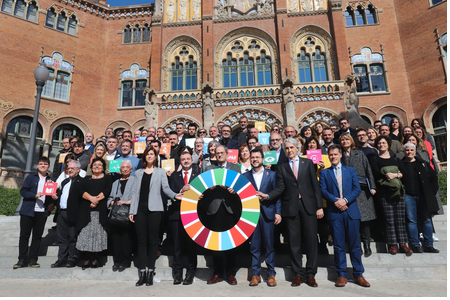- The president headed a ceremony today to mark the signing of an agreement that launches the Catalonia 2030 Alliance, a broad coalition aimed at achieving the Sustainable Development Goals set by the United Nations
- Vice-President Aragonès stressed that the Catalan government is “committed to taking action”, and Minister Bosch said that “now is the time for Catalonia to play a leadership role”

A midday today, the president of the Government of Catalonia, Quim Torra, headed a ceremony to mark the signing of the National Agreement for the 2030 Agenda, which he described as “a tool for the future”. Torra said the Plan “should become an instrument to help ensure consistency across policy aimed at achieving sustainable development”. According to the head of the government, institutions have a responsibility to “give people and the planet a chance”. The president said: “We are and want to be active participants in tackling global challenges and making the changes that need to happen.” He stressed that Catalonia was “prepared and actively working to transform Catalonia and improve the world”.
Over 300 people, representing some thirty Catalan organisations and entities from a range of spheres, made it possible to reach the agreement signed today, which marks the launch of the Catalonia 2030 Alliance, a broad coalition aimed at achieving the 17 Sustainable Development Goals (SDGs) set by the United Nations. In the coming months, the Catalonia 2030 Alliance will seek to bring more partners throughout Catalonia on board and encourage them to sign up to the Agreement, inviting the participation of all Catalan organisations committed to achieving these goals.
The signing ceremony was held this morning at the Sant Pau Art Nouveau Site, with the participation of the Vice-President and Minister of Economy and Finance, Pere Aragonès; and the Minister for Foreign Action, Institutional Relations and Transparency, Alfred Bosch. A total of 33 organisations have signed the Catalan national pact to create “a future that leaves no one behind and does not exceed the carrying capacity of nature” with the goal of “making Catalonia and the world a better place by 2030”, as the document states.
President Torra stressed the Catalan government’s commitment to “making the SDGs an integral part of policy action” and said this commitment was reflected in the fact that “we’ve prepared and worked on the budget in a way that takes this vision into account”. The head of the government also told attendees that the Catalan government would be a pioneer in planning with the 2030 horizon and the SDGs in mind.
Torra said, “We face urgent challenges of immense magnitude,” citing the example of Storm Gloria and flooding in Conca de Barberà and other places around Catalonia, the impact of lower prices for agricultural products, and rising child poverty, among other issues. In this scenario, the head of the government emphasised the importance of having a broad alliance that includes public and private institutions as well as third-sector, social and economic entities. “The 2030 Agenda should help us create the right conditions for economic growth that is sustainable and inclusive, shared prosperity, and decent work for everyone.”
Echoing the ideas of Jeremy Rifkin, author of The Third Industrial Revolution, the president also stressed that “small territories and regional areas will play a key role in safeguarding our world”. The head of the government said small countries would be key to both the green revolution and the social revolution.
In his speech at the signing ceremony, Vice-President Aragonès said: “We’re committed to taking action, and we’ve aligned the Catalan government’s budget with the SDGs to make progress towards creating a nation of shared prosperity.” Aragonès added: “The best legacy we can leave for future generations is a world that’s fairer, more sustainable and more habitable.”
Minister Bosch said: “Now is the time for Catalonia to take the lead on the 2030 Agenda and the sustainability of the planet.” He also noted: “We wouldn’t be where we are now if it weren’t for ministers Romeva and Rull, who took the first steps on this path.” The minister also described the 2030 Agenda as “a true humanist revolution” and warned that failing to achieve the goals it sets out would “put humanity at risk”.
Catalonia’s road map for the 2030 Agenda
The presentation of the Catalonia 2030 Alliance began with a speech by the Secretary for Foreign Action and the European Union, Mireia Borrell Porta, who recalled that in September the Catalan government approved the National Plan for the 2030 Agenda, which contains over 900 commitments by all government’s ministries to implement the 17 SDGs in Catalonia. The chairman of the Advisory Council for Sustainable Development, Ramon Roca, explained the role of this body in giving concrete form to the implementation of the 2030 Agenda in Catalonia and noted that the National Plan for the 2030 Agenda, the National Agreement and the 2030 Alliance all emerge from a mandate of the Parliament of Catalonia.